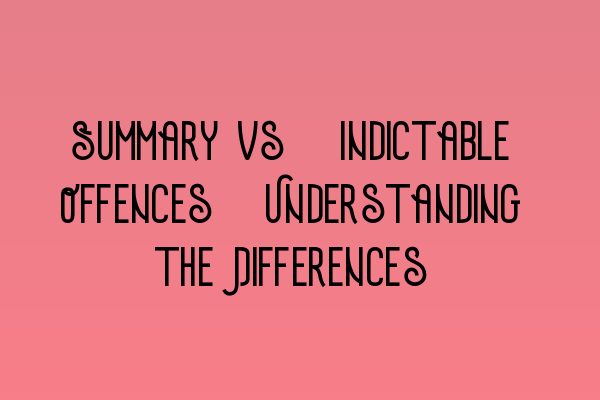Summary vs. Indictable Offences: Understanding the Differences
When it comes to criminal law, understanding the differences between summary and indictable offences is crucial. These two classifications determine how a case is heard in court and the severity of the potential penalties. In this article, we will delve into the nuances of these classifications and help you gain a better understanding of their implications.
Summary Offences
Summary offences, also known as minor offences, are less serious in nature and are usually heard in a Magistrates’ Court. These offences do not have the right to a trial by jury and are typically dealt with summarily, hence the name. Some common examples of summary offences include petty theft, minor assaults, and traffic violations.
In cases of summary offences, the penalties imposed by the court are generally less severe compared to indictable offences. This may include fines, community service, probation, or a short-term prison sentence. It is important to note that individuals charged with summary offences have the option to elect for a trial by jury if they feel their case warrants it.
Wondering how to prepare for your SQE 1 exam? Check out our SQE 1 Practice Exam Questions and SQE 1 Practice Mocks FLK1 FLK2 resources.
Indictable Offences
Indictable offences are serious crimes that are heard in Crown Court. These offences carry more severe penalties, including longer prison sentences and larger fines. Examples of indictable offences include murder, robbery, fraud, and drug trafficking.
In cases of indictable offences, the accused has the right to a trial by jury. This means that a panel of impartial individuals will hear the evidence and decide on the guilt or innocence of the defendant. The trial process for indictable offences can be complex and lengthy, involving various stages such as arraignment, plea, and trial.
If you are looking for comprehensive preparation courses for the SQE exams, check out our SQE 2 Preparation Courses and SQE 1 Preparation Courses to enhance your legal knowledge and boost your chances of success.
It is important to note that some offences can be classified as either summary or indictable, depending on the seriousness and circumstances surrounding the case. These are known as either-way offences and can be heard in either the Magistrates’ Court or Crown Court, depending on various factors such as the accused’s criminal history and the severity of the offence.
In Conclusion
Understanding the differences between summary and indictable offences is vital in the field of criminal law. Both classifications have their own set of procedures, penalties, and court systems. By being aware of these differences, legal professionals can provide better guidance and representation to their clients.
Stay informed about the latest SRA SQE exam dates to ensure you are well-prepared for your upcoming exams. Visit our SRA SQE Exam Dates page for more information.
Overall, whether you are dealing with a summary or indictable offence, seeking legal advice and representation from an experienced criminal solicitor is crucial. They will guide you through the legal process, ensure your rights are protected, and work towards the best possible outcome for your case.
